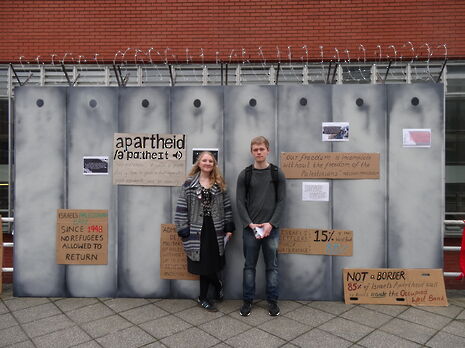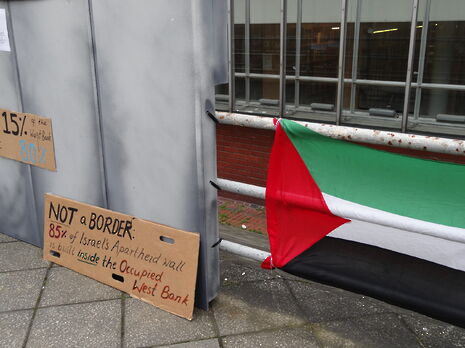Palestinian Society builds wall on Sidgwick Site in protest against Israel
The demonstration kicked off Israeli Apartheid Week, a series of lectures and other events directed at Israeli policy in the West Bank and Gaza

Humanities students hurrying to lectures on Tuesday will have been greeted with an unusual sight: a large replica wall propped up against a fence outside the Faculty of History.
The wall was the work of the Cambridge University Palestinian Society (PalSoc) as the inaugural event in Cambridge of Israeli Apartheid Week, a series of rallies and talks which is observed at universities across the world.
Standing 2.5 metres high, with a length of 4.8 metres and topped with fake barbed wire, the PalSoc wall was a replica of the barrier built to separate Israel and the West Bank territory.
Israel began constructing the still-unfinished barrier, which is 8m high and is intended to stretch over 810km when completed, in 2002 as a defence against suicide bombings from the West Bank, a purpose it argues the barrier has fulfilled.
However, critics say the barrier is tantamount to a de facto annexation of Palestinian land. he barrier has been de- clared to be in contravention of interna- tional law by the International Court of Justice, and condemned by the General Assembly of the United Nations.
The PalSoc wall was emblazoned with slogans representing this disapprobation. One particularly prominent sign defined ‘apartheid’ as “‘separateness’, ‘division of people’, any system or practice that separates people according to race or ethnicity”. Another carried a quote from Nelson Mandela: “our freedom is incomplete without the freedom of the Palestinians.”
One sign denounced “Israel’s Pales- tinian Ban”, citing the prohibition on Palestinian refugees returning to Israel. Another claimed that 85 per cent of the wall is located in the West Bank, rather than on the boundary between Israel and the territory.
PalSoc claims that their demonstration is intended to raise awareness of this issue. In a statement, a spokesperson for PalSoc expressed hope “that this ambitious visual display will make students reflect upon the apartheid which sadly still exists in our world today.”

This was echoed by the President of PalSoc, who told Varsity that the aim was “to raise awareness of the policies of Israel and the oppression of the Palestinian people.”
She said that they had chosen to focus on the wall for their opening event because it is “the most visually striking example of apartheid policy”, and particularly relevant after the election of President Donald Trump, who has already taken the first steps towards building a wall on the southern border of the USA.
Israeli Apartheid Week has been criticised for its links with the controversial Boycott, Divestment and Sanctions (BDS) campaign and for its use of the term ‘apartheid’, which was invented for the white supremacist regime which ruled South Africa until 1991, to describe the state of Israel, a characterisation which has been called offensive.
Such criticisms have been echoed by the Cambridge University Israel Society. A spokesperson for the society told Varsity: “This year’s Israeli Apartheid Week programme and the grossly inaccurate replica of Israel’s security barrier sadly demonstrates certain members of the student community’s continued desire to opt for misinformed protest and delegitimisation at the expense of productive dialogue.
“This marks a continuation of the Pal- estine Society’s previous attitudes; boy- cotting Union events with Israeli speak- ers as well as last year’s cross-society initiative, Middle East Peace Week.”
They added: “Israeli Apartheid Week and its misinformation is counterpro- ductive to genuine discussion and pros- pects of peace.”
However, the PalSoc President insisted that the protest was simply “an engaging exhibition” designed “to raise awareness”.
She said that PalSoc’s aim is not to lead the campaign against Israel itself so much as to amplify Palestinian voices: “voices of Palestinians have to be heard.” Part of this, she said, is raising awareness “of the situation on the ground” in order “to put pressure on Israel to end its policies.”
She added that Palestinians in the West Bank and Gaza have expressed their appreciation of the work of students in “standing up for them”, which they have found “humbling and uplifting”
 News / University Council rescinds University Centre membership20 February 2026
News / University Council rescinds University Centre membership20 February 2026 News / Hundreds of Cambridge academics demand vote on fate of vet course20 February 2026
News / Hundreds of Cambridge academics demand vote on fate of vet course20 February 2026 News / Judge Business School advisor resigns over Epstein and Andrew links18 February 2026
News / Judge Business School advisor resigns over Epstein and Andrew links18 February 2026 News / Union cancels event with Sri Lankan politician after Tamil societies express ‘profound outrage’20 February 2026
News / Union cancels event with Sri Lankan politician after Tamil societies express ‘profound outrage’20 February 2026 News / Caius students fail to pass Pride flag proposal20 February 2026
News / Caius students fail to pass Pride flag proposal20 February 2026









